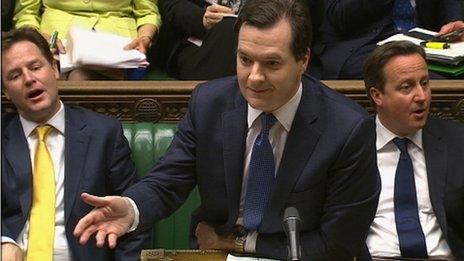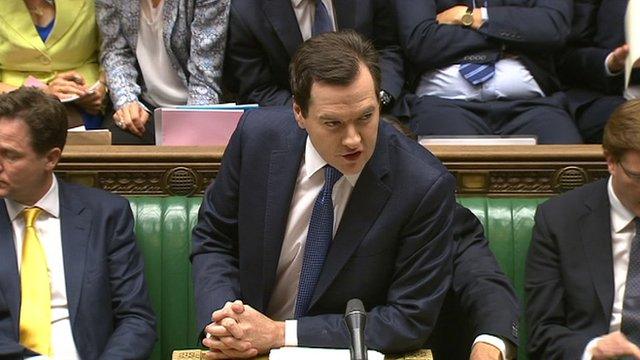Competing narratives on spending
- Published

The Chancellor set a course which includes constraining the public sector
Narrative matters in politics. Our leaders are most content when events appear to lend themselves to the portrait they are already sketching for the electorate. Or can be constrained to do so.
Hence the rather droll gag delivered by the Shadow Chancellor on the Chancellor's nomenclature. He said that George (who began life as Gideon) was called Jeffrey by President Obama before adding: "To everyone else you are just Bungle."
The House chortled, not least at the courage displayed by a man called Balls in joking about names. But the Shadow Chancellor wasn't finished. Pointing to the Prime Minister, he said: "Even Zippy on the front bench can't help smiling."
Which would make the First Lord of the Treasury a Dundee United fan. (Look it up.)
And the narrative? That the Rainbow of cuts and capital expenditure hikes is driven by the failure of the UK government to revive the economy thus far. Naturally, the Chancellor dissents, arguing that the challenging legacy left to his administration has since been exasperated by the euro crisis and sundry other shocks.
Benefit changes
And Scotland? There is a direct impact through the changes to reserved expenditure, notably on welfare. The debate on benefit changes will be just as salient here as south of the border. We now have a prospective cap on the overall budget to add to the cap on individual payments.
There is also, of course, an indirect impact through changes to the Scottish block. Indirect only inasmuch as the detailed allocation of funds now falls to John Swinney, the finance secretary.
As ever, we have competing interpretations. The Scotland Office points to enhanced capital provision which, they say, amounts to an increase of 12.9% in real terms from 2014/15 to 2015/16, the year covered by today's statement.
In response, Mr Swinney notes that revenue - that is, day-to-day - spending drops by nearly 2% in real terms while the capital provision is largely made up by borrowing powers, requiring repayment. And it follows successive capital cuts.
Competing points. Competing narratives. Related of course to that event in September 2014. Scottish Secretary Michael Moore argued that the spending review proves the value of devolution within the Union, providing support to Scotland from the broad tax base of the UK.
Pay curbs
Mr Swinney argues that it proves precisely the opposite: that potentially wealthy Scotland is being deprived of opportunities to drive growth. For Labour, Margaret Curran condemns the coalition - but also argues that the SNP Scottish government could do more with current powers.
However, there is another intriguing issue where narrative is important. That is the subject of public sector wages.
George Osborne signalled continuing curbs on pay together with the removal of automatic annual regrading in the civil service. There would be a concomitant drive to extend that to the NHS, prisons and police.
The narrative? The public sector should be constrained, not just from cash necessity but philosophically. Growth will come from liberating the private sector.
At which point, over to John Swinney. Will he replicate pay constraint? Mr Swinney will announce his decisions later, when he sets out his draft budget in the autumn and subsequently.
He is, in his turn, constrained by the spending block allocated to him. But, still, it seems likely to me that he would seek to depart, if only marginally, from the pay limits laid down by the Chancellor.
A narrative of combating public sector workers over pay might well suit the Chancellor, with the UK General Election due in May 2015. It perhaps jars somewhat for the Finance Secretary; in general and in particular with an eye to the referendum in September 2014.
Mr Swinney, understandably, is saying little on the subject at the moment other than to note that he wants to work with the grain of the public sector in Scotland. Much to ponder after today's statement.
PS: My Big Debate comes from Barra on Friday. We will broadcast live from Castlebay Hall at noon. Anyone who wants to join the audience can register online or email brian@bbc.co.uk. Would welcome questions too.
- Published26 June 2013
